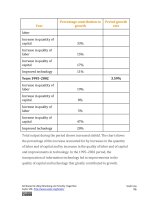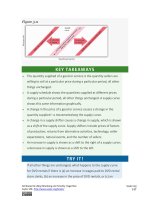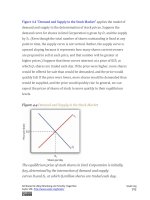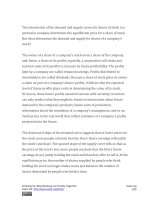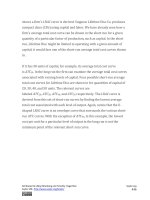Authors libby rittenberg 711
Bạn đang xem bản rút gọn của tài liệu. Xem và tải ngay bản đầy đủ của tài liệu tại đây (351.42 KB, 1 trang )
3. Discuss the market for renewable natural resources and relate the
market outcome to carrying capacity.
4. Explain and illustrate the concept of economic rent.
Natural resources are the gifts of nature. They include everything from oil
to fish in the sea to magnificent scenic vistas. The stock of a natural
resource is the quantity of the resource with which the earth is endowed.
For example, a certain amount of oil lies in the earth, a certain population
of fish live in the sea, and a certain number of acres make up an area such
as Yellowstone National Park or Manhattan. These stocks of natural
resources, in turn, can be used to produce a flow of goods and services.
Each year, we can extract a certain quantity of oil, harvest a certain
quantity of fish, and enjoy a certain number of visits to Yellowstone.
As with capital, we examine the allocation of natural resources among
alternative uses across time. By definition, natural resources cannot be
produced. Our consumption of the services of natural resources in one
period can affect their availability in future periods. We must thus consider
the extent to which the expected demands of future generations should be
taken into account when we allocate natural resources.
Natural resources often present problems of property rights in their
allocation. A resource for which exclusive property rights have not been
defined will be allocated as a common property resource. In such a case,
we expect that the marketplace will not generate incentives to use the
resource efficiently. In the absence of government intervention, natural
resources that are common property may be destroyed. In this section, we
shall consider natural resources for which exclusive property rights have
Attributed to Libby Rittenberg and Timothy Tregarthen
Saylor URL: />
Saylor.org
711
